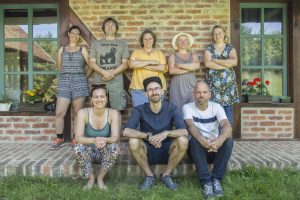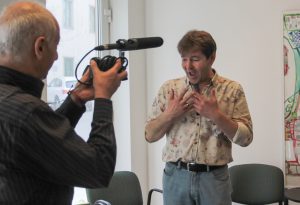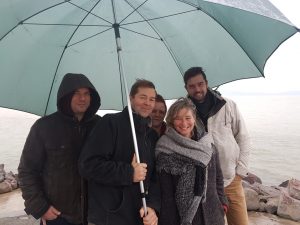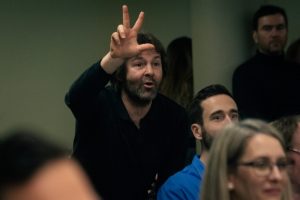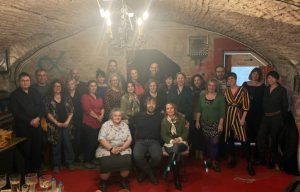“We can always do something. Always.” An interview with Tamás Scsaurszki, outgoing Chair of the Roots and Wings Foundation
15 Mar 2024
This interview originally appeared on the website of the Roots and Wings Foundation.
The Roots and Wings Foundation in Hungary spoke with Tamás Scsaurszki – the outgoing Chair of the foundation’s Board of Trustees (and current GFCF board member) – as he handed over the position to Julcsi Dés at the end of January 2024. In the interview Tamás reflects on his initial goals, the past, the future as well as the reasons for his departure.
Roots and Wings (R & W): From the first community foundation to a “background” organization, from a “background” organization to a national support organization with a budget of nearly €400,000, a staff of eight and more than 59 grantees: the Roots and Wings Foundation celebrates its 10th anniversary in 2024. What was your initial ambition?
Tamás Scsaurszki (TS): It is exactly thirty years this year that I have been working in the NGO sector, and one of the most intriguing issues for me, which has followed me throughout this period, is the financing of the sector: where will the money come from for NGOs? How can we increase the amount of money they receive? How can we improve the quality of the money they receive? The amount of money is clear. We all know that these organizations and the sector as a whole are grossly underfunded in relation to the tasks they set themselves and what society expects of them. But perhaps what is of even greater concern to me is how to improve the quality of funding, how to give money that really makes it easy, or as easy as possible, for NGOs to do their job. And within that, it is really the private grantmaking foundations that interest me. They cover a small part of the sector’s funding; in the US it is about 20%, and in Europe it is even less. These foundations tend to support issues that are not popular with society at large, companies or governments, such as long-term development programmes, the rights of ethnic and sexual minorities, social innovation, risky or controversial issues, the development of individual organizations and the sector as a whole, and the representation of community interests vis-à-vis political and economic power. Where there are few such foundations, these functions are obviously less apparent in the civic sector, but they are essential for a healthy, developing and strong civil society. There are very few grantmaking foundations in Hungary, which only made me more interested in them!
For me, the era of the Roots and Wings Foundation started with community foundations. I see them as a type of private foundation which can fulfil these funding functions. There were a number of aspects that excited me, but two things motivated me the most at the beginning. The first was that I saw in Ferencváros, the district of Budapest where I live, that there are a lot of small NGOs and informal civic groups that could not get good quality funding. When we started to think about organizing the Ferencváros Community Foundation, I was interested in whether we could create a system that could provide good quality money to these entities on a continuous basis. The other thing that motivated me was that at that time, around 2009, people in the NGO sector thought that “community foundations were great, but could not be done in Hungary.” This was a challenge that I found exciting and from that moment on we worked together with Gabi (Gabriella Benedek – ed.) and Edit (Edit Kovács – ed.).
“People in the NGO sector thought that ‘community foundations were great, but could not be done in Hungary.'”
So, we started working in 2009, and by 2013 it became clear that the community foundation we started in Ferencváros was going to thrive. We believed that if it could be done here, it could be done elsewhere in Hungary. By that time, the first attempts to nationally promote our results in Ferencváros had already failed, so we thought that a much stronger mechanism should be created to spread the community foundation concept in Hungary. This became the initial aim of Roots and Wings: to promote community foundations and support those brave and entrepreneurial individuals who wanted to establish one in their communities. We envisioned Roots and Wings as a “background” organization, not visible to the public, rather providing the legal and admin framework to the work. In the early years we used the “Community Foundation Support Programme” name exclusively, the Roots and Wings name did not appear anywhere. However, my experience was that organizations with only a community foundation support programme do not survive, they are very vulnerable and weak. Even though I didn’t have any other specific programmes in mind, I knew that working with community foundations wouldn’t be enough. If we wanted to make a positive contribution to Hungarian communities in the long term, we needed more programmes given that the social-political context in Hungary is hostile and unpredictable and you need to put your eggs into more than one basket.
R & W: What did you experience as successes in the last ten years?
TS: From the beginning I imagined Roots and Wings as a place to work with others. I like to work with fellow creators, so for me the first success was when we said – and there were five of us by that time – let’s go and travel around the region. Let’s see what experiences these countries have, where community foundation support organizations exist, what community foundations are good for and what they have achieved, and then let’s create our programme. We have been to Poland, the Czech Republic, Slovakia, and that was very helpful for me, because it was then that our team started to form and the common knowledge base started to develop, and then we could establish how we wanted to work.
It was about five years ago that I started to think of Roots and Wings as a private grantmaking foundation. My personal experience of the first grants made was that I looked at these grants a little differently than my colleagues. What I took from my five years at the Mott Foundation was that we should support opportunity and potential and not necessarily the best applications. Grantmaking is essentially a form of relationship building and I was looking for people and groups I was excited to be at the table with.
“Grantmaking is essentially a form of relationship building and I was looking for people and groups I was excited to be at the table with.”
When I look at the programmes, I have to say that ten years is the time – precisely because of the long-term nature of our work – that is needed to look at what we have done, what we have achieved. The Community Foundation Support Programme has come full circle. There are now twelve community foundations that raise around €200,000 locally each year and distribute roughly the same amount for local projects. You can see the strong foundations of a system that we built with our local partners to fund civil society at the local level, regardless whether funding is committed to support local projects at the national or international level. I think that is a huge thing in a country whose NGO sector is increasingly dependent on foreign funding. In our second programme, the Giving Circle Programme, we have introduced giving circles (aka live crowdfunding events) as a new community fundraising/funding method in Hungary, which I think is very appropriate for Hungary. So far, there have been 25 such events in the country supporting 77 local social change projects with over €200,000 in good quality money. These events have given the joy of giving and a memorable experience to the people who attended them. In a world where the space around the NGO sector is otherwise shrinking, this is great.
Turning to the two newer programmes, in the Revitalising Small Towns Programme we are experimenting with a funding method that may be appropriate for municipalities larger than villages but smaller than cities. We sought to contribute to the development of the local community, not through the support of an NGO, but through the support of one person, a charismatic community leader. I feel that this approach has great potential in Hungary, because the population of small towns is growing, their potential is being increasingly recognized, at the same time as the NGO sector is rapidly collapsing in these settlements. Just as I see potential in our Women’s Programme, which has really just been launched. Our aim is to strengthen women-centred approaches and advance the integration of women’s narratives, realities and interests into Hungarian society. At the moment, Hungary is one of the worst countries in Europe in this regard, but I am convinced that Hungarian society is mature and open to hearing this, and that there will be a breakthrough in the next few years. And this is what we can contribute to this breakthrough.
R & W: What have been the most important challenges, possible failures?
TS: What we dreamt of but have not achieved, or have not achieved yet, is the proper roll-out of giving circles across the country. I have a dissatisfaction with that, I thought the concept of an atmospheric community event where exciting social change projects can be supported would be more popular, and I feel that we have not been able to do that. I hope it is simply that we have not been able to do it yet.
We also started working with the Hungarian diaspora. We understood that Hungarians living abroad care and are concerned for Hungary, but we have not found the right narrative and the right way to inspire them to contribute to the development of their homeland. I see this as a failure.
As a third failure, I would consider that we have not been able to attract major donors in Hungary, in the order of tens of thousands of euros, to support our work and build the world of private grantmaking foundations. Unfortunately, this is not the way our country has gone in the last ten years. I see that many Hungarian companies which had been supporting the Hungarian NGO sector in the past have withdrawn their support. Few of the people on the list of wealthy people in Hungary support the independent NGO sector with a significant amount of money in relation to their wealth. As far as I can see, only a few NGOs have achieved success in this area, but it bothers me that we have not.
R & W: Why did you decide to hand over the leadership of Roots and Wings?
TS: I have never worked anywhere as long as I have at Roots and Wings. During the ten years I have been here, Roots and Wings has really been a part of my everyday life, but I would like to do something different in the future and give others a chance in the foundation. I am particularly pleased that the foundation team has become much younger in recent times. I believe that change is good for everyone: for me and for the foundation, and I really have immense faith in the team at Roots and Wings to keep doing it better.
R & W: How do you see the future of Roots and Wings?
TS: I am optimistic in the sense that we can always do something. Always.
Firstly, I see an indestructible will to act in parts of Hungarian society, and if we recognize this, then the ground is already set for a support organization. We have to be clever and use what little resources we have to support active people well. Secondly, I think we have ten years behind us and can understand what we do and how we do it. We are not a regranting organization. We design and implement our own long-term programmes through providing financial, professional and human support to NGOs, communities and individuals on a trust basis. This is a very distinct alternative to the grants available in Hungary today, and for those who want to do this kind of trust-based philanthropy, we offer a good opportunity to do it using our knowledge and experience.
“There are always challenges, but if you have no perspective, no faith, you can hang up your boots. This is particularly true in Hungary today.”
Of course, I also see great challenges, such as over-dependence on foreign funding, but I am still optimistic (or naive?) because I have followed closely how the first community foundations were created in neighbouring countries. It took them long years to become significant actors. There are always challenges, but if you have no perspective, no faith, you can hang up your boots. This is particularly true in Hungary today.


